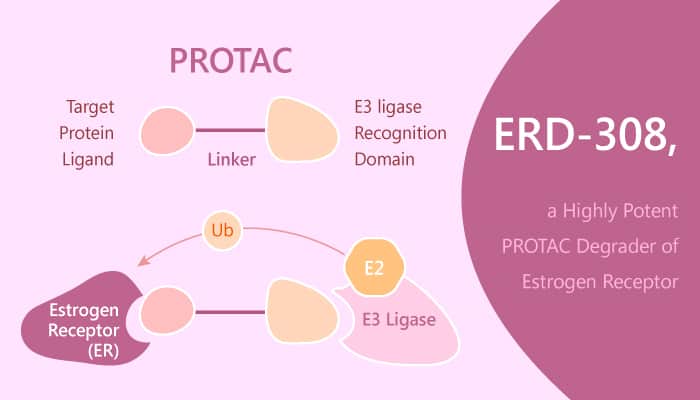In previous blogs, I have introduced some compounds based on PROTAC technology, including SJFδ, MS4077, BSJ-03-123, A1874, HJB97, Olutasidenib. Today, I’d like to introduce another novel compound ERD-308 as a highly potent PROTAC degrader of estrogen receptor (ER).

Breast cancer (BC) is a common malignancy in women worldwide. Besides, breast cancer can be subdivided into ER-positive (ER+), human epidermal growth factor receptor 2 (HER2)-positive (HER2+), and triple-negative subtypes. Usually, ER+ breast cancer occurs in approximately 80% of newly diagnosed breast cancer cases. ERα and ERβ are transcription factors that regulate gene expression and mediate the biological effects of estrogen. Subsequently, ERα is verified to be the major mediator that transduces the estrogen signaling, and ERα has been recognized as a promising therapeutic target in multiple pathological settings, particularly in breast cancer.
The study from Jiantao Hu identified ERD-308 as an effective ER degrader based on PROTAC. ERD-308 is a highly potent PROTAC degrader of estrogen receptor (ER) for ER-positive breast cancer treatment. ERD-308 induces >95% of ER degradation at concentrations as low as 5 nM in both MCF-7 and T47D ER+ cell lines (DC50 (concentration causing 50% of protein degradation) of 0.17 nM and 0.43 nM in MCF-7 and T47D ER+ cells, respectively).
In addition, in MCF-7 and T47D ER+ breast cancer cells, ERD-308 clearly down-regulated the expression of ER time- and dose-dependently. Furthermore, ERD-308 displayed faster degradation kinetics and more complete degradation than Fulvestrant, which is a marketed drug that has been widely used in breast cancer treatment.